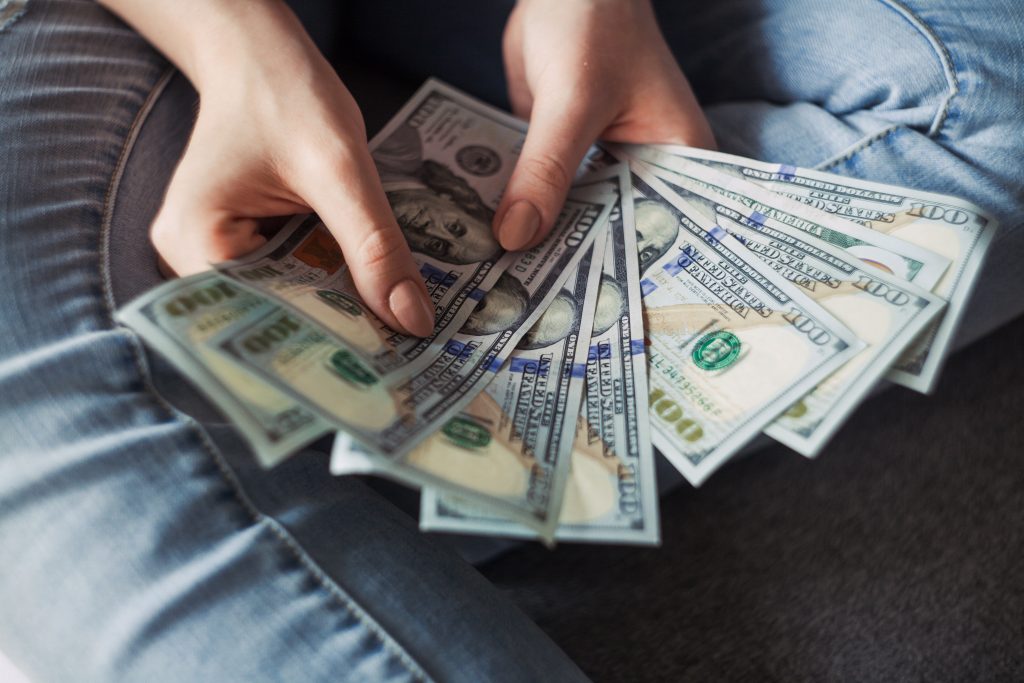Going into debt is a bit like gaining weight. It’s much easier to go into debt than to get out. But, when you’ve finally decided you want to break the debt cycle and live debt free, it takes a lot of time and effort, much more effort than it took to go into debt. Likewise, when you decide you want to be fit and healthy, you have to work much harder than you did to gain weight. With either situation, when you decide you want to make a healthier change, you want it to happen.right.now! That’s why so many people who want to be debt free decide to save only a $1,000 emergency fund and put the rest of their money on debt. We’ve tried that before, but there are several reasons why we’ve decided not to throw extra money at our debt now.
Get Off the Debt Repayment Roller Coaster

With COVID-19, we’re living in unstable times. But honestly, even before the virus, a $1,000 emergency fund was never enough. My husband and I have been in debt most of our lives.
When we were first married, we had student loan debt, car loan debt, and credit card debt from our time in college. We followed financial gurus who said have a $1,000 emergency fund and put the rest of the money on debt.
Some months, we had phenomenal success and paid down a significant amount of our debt. But other months, because we were living so close to the edge with only a $1,000 emergency fund, we’d have the unexpected happen such as a $2,500 car repair. Our emergency fund would be wiped out, plus we’d go back into debt to finish paying for the unexpected.
Going back into debt a few thousand dollars when we were trying to pay down debt was depressing. Plus, we’d have to pause our debt repayment and start back over to rebuild the emergency fund.
We paid off the credit cards eventually, but a few years ago, we went back into credit card debt when three things happened one summer—our HVAC system died, our house had mold and had to be remediated, and our child had a medical issue that wasn’t completely covered by insurance.
Since then, we’ve been working to build a more substantial emergency fund AND pay down debt. No more debt repayment roller coaster for me. This time I vowed when we paid down our debt, it would stay gone. But for that to happen, we needed a bigger emergency fund.
The Economy Is Too Uncertain
Now that COVID-19 has hit, we’re not paying any extra on our debt. We’re funneling all of our extra money to our emergency fund with the goal of hitting a 6-month emergency fund.
Why?
No one knows for sure what the economic impact of this virus will be. I want to make sure my family has enough cushion to survive. That means creating an ample emergency fund.
Prepare for Potential Job Loss

We’ve been lucky that my husband hasn’t lost his job. He’s in the higher education field, which is being hit especially hard by this pandemic. He has to furlough for 39 days this upcoming year, which means we will essentially be losing two months of pay in the next 12 months. However, we’re grateful that he still has a job.
But what will happen next year?
There is a very real possibility his job could be in jeopardy next year, depending on how badly this year goes. We want to be prepared. Sure, it would be nice if we could get our debt load down, but right now, we’re just focusing on piling cash in the bank. We want an ample security net.
Much of the country is in the same predicament. If you work for or own a small business, how long can the business hold out? We’re already seeing some small businesses closing permanently, which means all of those employees will be looking for jobs.
I don’t want to advocate irresponsibility, but if you’ve lost your job and aren’t able to get a new one, you can always negotiate with your creditors or worst-case scenario, not pay your bills. However, if you don’t have money in the bank, you’re left without resources. Having a savings account in this situation always comes first.
Only Pay Down Debt After a 6 Month Emergency Fund Is Established
If you pause paying down your debt and only pay your minimum payments due, you can always change your plan later and pay more on your debts in a few months. That’s one of the major reasons why we’ve decided not to throw extra money at our debt now.
We’re going to save, and save, and save. If we, as a country, as a world, ride out this virus and it is no longer a threat, things can change. Let’s say my husband and I do save a six-month emergency fund. If, in another year or two, his job is stable, and the world is back to normal, we can change gears. Maybe we take three months’ worth of our emergency fund and throw it on our debt to pay it off. We can do that.
Final Thoughts
Though you may want to be debt free or carry a lower debt load, there are several good reasons to pause that goal. The main reason why we’ve decided not to throw extra money at our debt now is because having money in the bank is priceless, especially in the age of a pandemic.
We can later decide to take some of that large emergency fund and put the money on our debt. However, if we pay down our debt and stay with a $1,000 emergency fund, we’re extremely vulnerable financially to what may happen in the upcoming months. We intend to protect ourselves as well as we can from economic instability by saving as much as we can. There will be time later to aggressively pay down debt. We don’t believe now is that time.
Melissa is a writer and virtual assistant. She earned her Master’s from Southern Illinois University, and her Bachelor’s in English from the University of Michigan. When she’s not working, you can find her homeschooling her kids, reading a good book, or cooking. She resides in New York, where she loves the natural beauty of the area.


